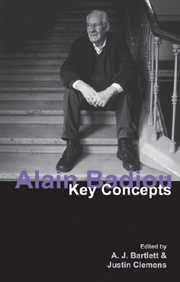Book contents
- Frontmatter
- Contents
- Contributors
- Acknowledgements
- Abbreviations
- Miscellaneous Frontmatter
- Introduction: Badiou's form
- 1 Biography and early works
- PART I THE FOUNDATIONS OF BADIOU'S THOUGHT
- 2 Philosophy
- 3 The conditions
- 4 The subject
- 5 Ontology
- PART II BADIOU'S KEY CONCEPTS OR “CONDITIONS”
- PART III BADIOU'S ENGAGEMENT WITH KEY PHILOSOPHERS
- Afterword: Badiou's futures
- Bibliography
- Index
3 - The conditions
from PART I - THE FOUNDATIONS OF BADIOU'S THOUGHT
- Frontmatter
- Contents
- Contributors
- Acknowledgements
- Abbreviations
- Miscellaneous Frontmatter
- Introduction: Badiou's form
- 1 Biography and early works
- PART I THE FOUNDATIONS OF BADIOU'S THOUGHT
- 2 Philosophy
- 3 The conditions
- 4 The subject
- 5 Ontology
- PART II BADIOU'S KEY CONCEPTS OR “CONDITIONS”
- PART III BADIOU'S ENGAGEMENT WITH KEY PHILOSOPHERS
- Afterword: Badiou's futures
- Bibliography
- Index
Summary
The concept
Perhaps the crucial concept in Badiou's work since Being and Event (1988) is that of “conditions”. The concept is developed between Theory of the Subject (1982) and Being and Event, and is the marker of an irreversible internal rupture. Its importance is consecrated in the title of a collection of essays Conditions (1992), and its implications explored in every significant text from Manifesto for Philosophy (1989) to Logics of Worlds (2006). This is not to say that there are not abiding interests throughout Badiou's early writings and his post-Being and Event work. But abiding interests are not necessarily evidence of real continuity. The rupture in Badiou's work between Theory of the Subject and Being and Event may be considered a move from assuming philosophy's actuality to reconsidering philosophy's possibility. In doing so, Badiou comes to recognize that “philosophy” is not a synonym for “thought” in general, nor is it the essence or paradigm of thought, nor is it what gives firm grounds to knowledge, nor is it even what interrogates thinking as such.
What does it mean that philosophy is always on condition? First, that philosophy is not an independent discourse. On the contrary, philosophy is entirely dependent on its conditions. Philosophy does not and cannot think by itself. Second, philosophy emerges only in response to a certain kind of demand. Philosophy thinks only under pressure. But this pressure is not merely the result of empirical factors. Only the fact that there is already thinking going on and, moreover, heterogeneous kinds of thinking, makes philosophy possible.
- Type
- Chapter
- Information
- Alain BadiouKey Concepts, pp. 25 - 37Publisher: Acumen PublishingPrint publication year: 2010



